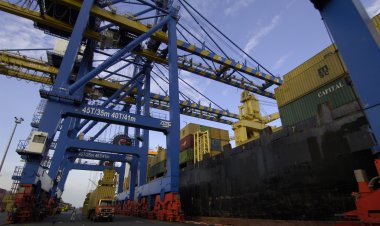Summary
- The African Continental Free Trade Area (AfCFTA) agreement is in progress, and the Investment Protocol is aimed at promoting and facilitating investment within Africa. The Protocol can enhance Africa's business climate and attract foreign direct investment.
- The protocol calls for the establishment of a Pan-African Trade and Investment Agency. The agency will mobilise resources, encourage business growth, and offer technical assistance for investment promotion. It will also facilitate coordination and dialogue among key stakeholders.
- A coordinated investment promotion effort will be crucial for the successful implementation of the AfCFTA. It is necessary to scale up the production of complex goods, requiring foreign and domestic investment in African economies
- Regional value chains are key to a successful AfCFTA. Countries with complementary production structures can form supply and demand markets for specific inputs and outputs. Efforts have been made to identify potential value chains and the countries with a competitive advantage for different segments.
- Coordinated investment promotion is crucial, especially in sectors like the automotive industry. It can strengthen the investment case for foreign and domestic investors, create agglomeration economies, and lead to a concentration of skilled specialist labour in a particular region. This approach is more feasible for the AfCFTA Secretariat and aligns with the national interests of participating agencies.
Introduction
The process of fully launching the African Continental Free Trade Area (AfCFTA) agreement is still underway. However, efforts to prepare Africa for this new trading era are progressing rapidly. One of the successfully negotiated protocols focuses on supporting, promoting and facilitating investment within Africa. If implemented correctly, the Investment Protocol can also enhance Africa's business climate and make the free trade area more appealing to foreign direct investment.
Introducing the Pan-African Trade and Investment Agency
The Protocol includes a coordination role and calls for the creation of a Pan-African Trade and Investment Agency. As stated in Article 42 of the January 2023 version of the draft protocol, the Agency will support countries, their investment promotion agencies and the private sector by mobilising financial resources, encouraging business growth and offering technical assistance for investment promotion and facilitation in line with the Protocol's provisions. The agency will also help countries enhance their ability to create and implement investment policies that boost intra-African investments, particularly policies that increase exports. In addition, it will facilitate coordination and dialogue among key stakeholders, enabling the exchange of information related to trade, export promotion, investment opportunities, peer learning and best practices.
The agency is envisioned as a technical institution of the AfCFTA Secretariat. It will therefore be faced with a similar task of carefully navigating the diverse political, economic and social environments of the AfCFTA’s 54 member states. From the Algerian Investment Promotion Agency (AAPI) to the Zimbabwe Investment and Development Agency (ZIDA), all 54 state parties have national investment promotion agencies that have been tasked with attracting domestic and foreign direct investment into their economies.
Investment will power the single market
There is, however, no doubt that a coordinated investment promotion effort will contribute to successfully implementing the AfCFTA. The reasons are simple. The AfCFTA seeks to increase intra-African trade, drive industrial growth and grow prosperity on the continent. Eliminating a majority of the tariffs on goods and services on its own is not enough to significantly increase intra-African trade. Reducing the infamous non-tariff barriers will have a greater impact, but even that will be limited if there are not enough made-in-Africa goods to trade. Most African countries produce and export commodities such as peanuts, copper or crude oil. Scaling up production of more complex goods will require both foreign and domestic investment in African economies. Those investments will not only bring in much needed capital but can also help improve knowledge and capabilities.
Several global businesses are operating in Africa and thriving, but many more are still wary of betting on the continent. News of volatile regulatory environments, insecurity, fragmented markets and low effective demand causes the eyes of some global business leaders to glaze over when they hear speeches about investing in Africa. It’s difficult to deny that some individual African markets struggle with competitiveness, but the AfCFTA seeks to create a single market that could address this issue.
The case for regional value chains
A successful AfCFTA will require African countries to work together much more than they ever have. Most countries have struggled to reach the minimum levels of manufacturing capacity and output that can drive industrialisation and structural transformation, but perhaps this can change if they go at it together. This potential is partly the rationale behind developing regional value chains on the continent: countries with complementary production structures can come together as supply and demand markets for specific inputs and outputs, towards a final finished product that has a minimum level of complexity.
There have been some efforts to figure out what these value chains might look like. In 2021, the United Nations Development Programme worked with the AfCFTA Secretariat to produce a comprehensive report titled “Value Chains for a Made-in-Africa Revolution”. In 2022, the International Trade Centre worked with the African Union and the European Union to produce a report titled “Made by Africa: Creating Value Through Integration”. The former report identified nine priority value chains under the AfCFTA. The latter selected four pilot value chains from a pool of 94 promising options. Both lists had three value chains in common - pharmaceuticals, automotives and textiles and apparel. Some work has also been put into identifying which countries have a competitive advantage for different segments of these value chains. Once priority sectors and their possible locations have been sorted, the next step will be attracting and facilitating investment into these value chains. This step will, however, require a collective effort from value chain members, justifying coordinated investment promotion.
Why we need to coordinate investment promotion
One potential sector for coordinated investment promotion in Africa is the automotive industry. It was valued at $30.44 billion in 2021 and is expected to reach $42.06 billion by 2027. Some African countries that have an advantage in the automotive value chain are South Africa, Morocco, Tunisia, Botswana, Kenya and Ghana. If a selection of these countries with regional proximity decided to synergise their production structures towards a complete automotive value chain, they would need to similarly cooperate in promoting the value chain for investment.
Knowledge of the existence of suppliers and buyers for the various inputs and outputs of potential factories strengthens the investment case for foreign and domestic investors. There are a number of other important spillover effects that can create agglomeration economies, especially if locations along a value chain are close to each other. Agglomeration economies allow firm networks to be created and can also lead to a concentration of skilled specialist labour in a particular region. All of these factors can make African economies more attractive for investment and help increase economies of scale, grow productivity and drive industrialisation. They can also enable a more targeted deployment of infrastructure investment to improve transportation networks and facilities.
How to coordinate investment promotion
As mentioned earlier, the 54 member states of the AfCFTA have 54 investment promotion agencies with distinct priorities, diverse governance structures and varying capacities and resources. A broad attempt at coordinating the activities of these agencies may be daunting for the proposed Pan-African Trade and Investment Agency. It will also be highly demanding of the limited resources available for implementing the AfCFTA.
This article has, however, attempted to build a case for targeted coordinated investment promotion guided by sector priorities and regional value chains. Coordinating investment promotion in this way gives participating agencies a common mission that may be more closely aligned to their national interests. This mission would help prevent the perennial clashes between continental aspirations and national policies that challenge most regional integration projects. These clashes are already slowing down the implementation of the AfCFTA, with the still-pending Rules of Origin negotiations.
This approach may also be a more feasible pilot project for the AfCFTA Secretariat, given that it is to perform these responsibilities prior to the establishment of the Pan-African Trade and Investment Agency.
What to do next
Possible next steps may include substantiating and validating existing knowledge on regional value chains in Africa with relevant investment promotion agencies. The implementation of a pilot project will need to be adaptive and should be able to work with private sector bodies or other government agencies where investment promotion agencies are found to have little capacity or influence. The process will kickstart efforts to properly synergise the production and regulatory structures of value chain members and increase their complementarity. Progress on these fronts will support investor targeting and proactive investment promotion.
About the Author
Teniola Tayo is a Policy Advisor with a focus on regional integration issues in Africa including the African Continental Free Trade Area and wider trade, security and development policies on the continent. She is currently the Trade Policy Fellow at the Africa Policy Research Institute. She has previously worked as a consultant with the Institute for Security Studies, Supply Chain Africa, United Nations Development Programme, and the West African think tank. She has also worked as a senior legislative aide with the Nigerian Senate and a consultant with the Office of the Vice President. She has a Masters degree from the London School of Economics, a Bachelors degree from the University of Ghana, and recently completed a fellowship at the European University Institute's School of Transnational Governance.




